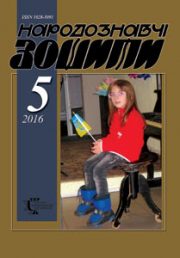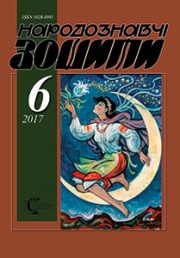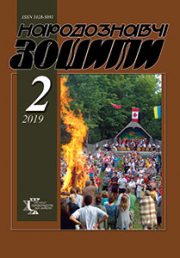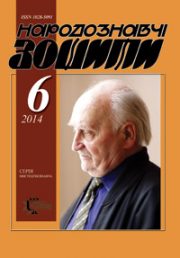The Ethnology Notebooks. 2020. № 2 (152), 260—266
UDK 39 (=163.42):930.2(477)]:303.683
DOI https://doi.org/10.15407/nz2020.02.260
SOME ISSUES OF THE ETHNOGENESIS OF CROATS IN MODERN CROATIAN SCIENCE
PASHCHENKO Yevhen
Scopus ID: 55804653800
Doctor of Sciences in History, Professor
of the chair of Ukrainian language
and literature of the department of philosophy
of Zagreb university (Croatia)
Trg Republike Hrvatske 14, 10000, Zagreb
Abstract. Introduction. The object of the study is primarily materials from Ukraine in the works of modern Croatian authors. A subject of the study is specific questions: origin of the Croatians, when they come to the southeastern places, meaning of the ethnonym and others.
Geographically and chronologically problem stems from a wide geographical space and material, while the article focuses mainly on the analysis of materials from Ukraine in modern Croatian science.
Formulation of the problem. The problem of Croatian ethnogenesis nowadays is a great historiography. This problem is treated from different perspectives and gives different conclusions. This, in fact, caused by the scientific relevance of the article.
The purpose of the work is to highlight and analyze some of the facts and not enough researched questions of Croatian ethnogenesis.
Methods. The paper used primarily typological and comparative-historical, cultural methods, structural elements of typological, geographical and other methods of ethnology.
Results. On the basis of archival and field sources, scientific literature reviewed and analyzed major and unexplored to date questions of Croatian ethnogenesis in modern Croatian science. Problem of Croatian ethnogenesis in modern Croatian science related to a wide geographical space and materials. At the same time, scientists are provided with unconditional support of constituent material from Ukraine, which requires a comprehensive, interdisciplinary comparison. It presents the main results of the study.
Conclusion. We are working on this research by looking at the complexity of the problem, a broad front of research areas and the topic still remains open. At the present stage it is an important presentation of the results of Ukrainian science in the study of ethnogenetical processes where one of the first, certainly not the only acts archaeological material and information about it. Lack of awareness of Ukrainian Information Fund felt in the Croatian researchers and vice versa – the lack of information on Croatian state — in Ukrainian. The next stages of studying could include the number of open questions about the research front, which continues to remain promising theme of science, including Slavic studies. However, at this stage it is difficult to talk about development of the study of old Slavic Studies, which, after two centuries past, call the era of the great Slavic studies in the twentieth century was the status that threatens to approach the status of unclaimed. However, focusing on the study of problems of national culture, gives rise to the dynamics in the study of actual problems that we can see the example of the Croatian perspective, some of which are outlined in this study.
Keywords: ethnogenesis, Croatians, mythology, Slavic, Carpathians.
Received 25.03.2020
REFERENCES
Еtnogeneza. Hrvatska enciklopedija. Zagreb: Leksikografskij zavod Miroslava Krleza. Retrieved from: http://www.enciklopedija.hr/natuknica.aspx?id=18527[in Croatian].
Paschenko, Yevhen. (2013). Problems and objectives of comparative study of Croatian ethnogenesis in Ukrainian context. Etnoheneza khorvativ i Ukraina (Pp. 290-315). Drohobych [in Ukrainian].
Paschenko, Yevhen. (1999). Etnogeneza i mitologija Hrvata u kontekstu Ukrajine. Zagreb [in Croatian].
Hrvati, Hrvatska enciklopedija: Retrieved from: http://www.enciklopedija.hr/Natuknica.aspx?ID=26386 [in Croatian].
Paschenko, Yevhen. Tajanstveno ime Hrvat. Etnogeneza i mitologija Hrvata u kontekstu Ukrajine (Pp. 61—74) [in Croatian].
Paschenko, Yevhen. (2016). The importance of landscape in toponymy contextualization. Sacralization of landscape and Sacred Places. Book of Abstracts / Belaj, Juraj (ur.) (Pp. 12—13). Zagreb: Institute of archeology.
Paschenko, Yevhen. Dubrovnik comparative Study in Slavic mythology. Balkan reading. 1 Symposium on the structure of the text (Pp. 133-136). Moskva: Akademija nauk SSSR; Institut slavjanovedenija i balkanistiki [in Russian].
Paschenko, Yevhen. Mytheme on the map of Dubrovnik. Visnyk of the Lviv University. Philological Series (Issue 59, pp. 77-82). Scientific journal [in Ukrainian].
Paschenko, Yevhen. (2017). Povijesni tekst prijelaznoga razdoblja: Neke osobitosti sadrzaja i forme Kraljevstva Slavena Mavra Orbinija. Komparativna povijest hrvatske knjizevnosti. Vrsta ili zanr. Zbornik radova s XIX. Međunarodnoga znanstvenog skupa (Pp. 48—63). Split; Zagreb: Knjizevni krug Split; Odsjek za komparativnu knjizevnost Filozofskoga fakulteta u Zagrebu [in Croatian].
Paschenko, Yevhen. Juraj Krizanic i Ukrajina. Graditelji europske krscanske unije. Zagreb: Matica hrvatska [in Croatian].
Paschenko, Yevhen, & Nabytovych, I. (Ed.). (2016). Ukrainian Baroque role in the view of Juraj Krizhanich. Traveling through the Worlds and the Ages. Collection of Articles in Honor of Yuriy Peleshenko (Pp. 180-193). Kyiv; Drohobych: Posvit [in Ukrainian].







